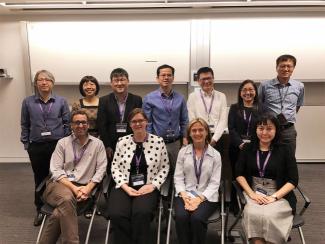
To advance the understanding of the concept of ‘equitable fraud’ in modern society, the Journal of Equity Annual Conference 2019 featured five papers that examine cutting-edge issues such as bribes and liability in equity, abuse of trust and corporate structures, undue influence, procedural ‘remedy’ in the assignment context, and misleading conduct in the consumer protection context.
Above: Conveners, chairs, presenters and SMU School of Law participants at the Journal of Equity Annual Conference 2019, jointly organised by the Centre for Cross-Border Commercial Law in Asia (SMU) and the Journal of Equity.By Yip Man & Jiang Huiqin

SMU School of Law - The Journal of Equity Annual Conference 2019 ‑ ‘Equitable Fraud’, jointly organised by CEBCLA and Journal of Equity, took place at SMU, School of Law on 14 February 2019. The conference kickstarted with the Guest of Honour of the Conference, Judge of Appeal, Justice Andrew Phang’s Welcome Address. Inspiring the audience with his passion and erudition, Justice Phang observed that ‘the concept of equitable fraud [permeates] the entire equitable landscape – constituting the foundational spirit of a number of equitable doctrines’, but he stressed that legal knowledge and analysis relating to equitable fraud are best advanced ‘in the context of specific doctrines’. He concluded his Welcome Address with a brief reference to the recent landmark ruling by the Singapore Court in the case of BOM v BOK [2018] SGCA 83, which affirmed the narrow doctrine of unconscionability in Singapore law.

All five featured presenters are leading private law scholars with stellar research records. The first presenter was Associate Professor Rebecca Lee (University of Hong Kong, Faculty of Law), a renowned equity lawyer. She presented a thought-provoking paper on ‘Relief for Bribes in Equity’, focusing on the errant fiduciary’s liability for dishonest assistance and the principal’s right to rescission of the contract executed in connection with the receipt of a bribe by the fiduciary. She proposed that the latter strand of relief – rescission – may be analysed based on an accessory liability framework.

Professor Rick Bigwood (TC Beirne School of Law, University of Queensland), a contract law expert, was next. His paper provided the audience with an in-depth analysis of the development of the doctrine of undue influence. Based on the voluminous case law on the subject, he helpfully identified three approaches adopted by the courts: the ‘public-policy approach’, the ‘actual-victimization approach’, and the ‘impaired-consent approach’. Through an incisive examination of the distinctions between the approaches, he forcefully argued that the law should return to the ‘public-policy approach’ going forward.
Associate Professor Lee Pey Woan (SMU, School of Law), a corporate law and private law specialist, impressed the audience with a refreshing comparison between the abuse of corporate structures and the abuse of trust structures – practices that are increasingly prevalent to enable the perpetrators to achieve tax evasion and asset shielding purposes. She explained, with great clarity, the reasons that underpin the divergent doctrinal developments in the two contexts and reflected on if these developments should cohere and complement with each other in the search for an optimal legal solution.
The fourth paper was delivered by Professor Tham Chee Ho (SMU, School of Law), who was awarded D.Phil by University of Oxford in 2017. His conference paper was based on his doctoral thesis research work on the law of assignment and in particular, focused on the relief that may be obtained from the ‘equitable jurisdiction of the common law courts’, a subject that has fallen into oblivion. Professor Tham’s presentation also touched on implications for Singapore law which derived its common law principles from English law, illuminating a part of legal history that has thus far escaped scrutiny.
The conference ended with Professor Elise Bant (Melbourne Law School) presenting her co-authored work with Professor Jeannie Paterson (Melbourne Law School) – ‘Estoppel, Misleading Conduct and Equitable Fraud’. This paper forms part of an Australian Research Discovery Grant project on ‘Rationalising the Law of Misleading Conduct’. Their paper examines the evolving and intricate interface between statute and common law in a coherent and integrated legal system through analysing the phenomenon in the context of the doctrines of estoppel. The discussion, in particular, delves into a comparative scrutiny of consumer protection regimes in Australia, England and Singapore, as well as the evolving judicial cultures and styles of reasoning in these jurisdictions.

The roundtable format of the Conference sparked vigorous and constructive debates between the presenters and conference participants. The conference conveners, Professor Simone Degeling (University of New South Wales, Law School), Professor Elise Bant (Melbourne Law School), Professor Matthew Harding (Melbourne Law School) and Associate Professor Yip Man (SMU School of Law) are delighted to announce that the conference papers will be published in a forthcoming issue of Journal of Equity, a leading international refereed journal on current issues in the law of equity.
Image credit: